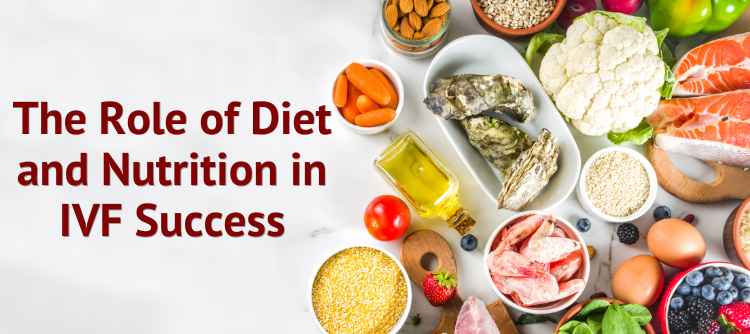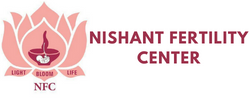The Role of Diet and Nutrition in IVF Success

In vitro fertilisation (IVF) can be an exciting and difficult path to begin. While medical interventions play a crucial role, the significance of a well-balanced diet should not be underestimated. In this blog post, we’ll delve into the relationship between a healthy diet and the likelihood of a successful IVF outcome. Additionally, we’ll explore some major superfoods that can aid in optimizing your body for the fertility process.
1. How does a healthy diet affect the chances of a successful IVF?
a. Balancing Hormones:
A well-rounded diet rich in essential nutrients contributes to hormonal balance, a key factor in successful IVF. Certain vitamins and minerals, such as vitamin D, zinc, and omega-3 fatty acids, play pivotal roles in regulating hormonal levels, creating an optimal environment for fertility.
b. Managing Weight:
Maintaining a healthy weight is crucial for fertility, as both underweight and overweight conditions can negatively impact IVF success rates. A balanced diet, combined with regular exercise, helps in achieving and sustaining a healthy weight, thereby enhancing the chances of a positive outcome.
c. Improving Egg and Sperm Quality:
Nutrient-dense foods, including fruits, vegetables, and whole grains, provide antioxidants that combat oxidative stress, a factor linked to poor egg and sperm quality. A diet high in antioxidants supports the reproductive cells, potentially leading to improved embryo development and implantation.
d. Enhancing Uterine Health:
Certain foods contribute to uterine health, creating an environment conducive to embryo implantation. Incorporating foods rich in iron, calcium, and vitamin C can strengthen the uterine lining, promoting a more favorable setting for successful IVF.
e. Reducing Inflammation:
Chronic inflammation can hinder the success of IVF. A diet focused on anti-inflammatory foods, such as fatty fish, nuts, and leafy greens, can help reduce inflammation and create a more supportive environment for fertility treatments.
2. Major Superfoods to Consider When Undergoing IVF:
a. Avocado:
Rich in healthy monounsaturated fats, avocados contribute to hormonal balance and support overall reproductive health. They also contain folate, a crucial nutrient for fetal development.
b. Berries:
Packed with antioxidants, berries help combat oxidative stress and inflammation. Blueberries, in particular, are known for their high levels of anthocyanins, which may positively impact fertility.
c. Fatty Fish:
Salmon, mackerel, and trout are excellent sources of omega-3 fatty acids, essential for reproductive health. Omega-3s may improve egg quality and regulate hormonal levels, promoting a favorable environment for IVF success.
d. Leafy Greens:
Spinach, kale, and Swiss chard provide a wealth of nutrients, including iron and vitamin C, which are vital for a healthy uterine lining and overall fertility.
e. Nuts and Seeds:
Almonds, walnuts, and flaxseeds are nutrient-dense options that contribute to reproductive health. They contain essential fatty acids and micronutrients that support the fertility journey.
3. Foods That Need to Be Avoided During Your IVF Journey:
a. Caffeine:
While moderate caffeine consumption is generally considered safe, excessive intake can negatively impact fertility. Studies suggest that high caffeine intake may be associated with a higher risk of miscarriage. During IVF, it’s advisable to limit caffeine intake to promote optimal reproductive health.
b. Alcohol:
Alcohol consumption is linked to fertility issues, and during IVF, it’s recommended to abstain from alcohol altogether. Research indicates that alcohol may interfere with hormone levels and disrupt the delicate balance required for successful fertility treatments.
c. Processed Foods:
Processed foods often contain trans fats, excessive sugars, and additives that can contribute to inflammation and hormonal imbalances. Opting for whole, unprocessed foods is crucial during IVF to create a supportive environment for reproductive health.
d. High-Mercury Fish:
Certain fish, like shark, swordfish, king mackerel, and tilefish, are known to have high mercury levels, which can negatively impact fertility and fetal development. Choose low-mercury alternatives like salmon, shrimp, and catfish to minimize potential risks.
e. Excessive Soy Products:
While soy can be a valuable source of plant-based protein, excessive consumption of soy products may interfere with hormonal balance due to its phytoestrogen content. Maintaining a moderate intake is recommended during the IVF process.
4. Major Considerations for a Healthy Diet During IVF:
a. Nutrient-Rich Foods:
Prioritize a diet rich in essential nutrients such as folic acid, iron, vitamin D, and omega-3 fatty acids. These nutrients play key roles in reproductive health and embryo development, contributing to the overall success of IVF.
b. Balanced Macronutrients:
Ensure a balanced intake of carbohydrates, proteins, and healthy fats. Carbohydrates provide energy, proteins support cell development, and healthy fats aid in hormone production—all crucial components for a successful IVF journey.
c. Hydration:
Proper hydration is essential for overall health and may positively impact fertility. Drinking an adequate amount of water helps maintain optimal bodily functions, including the production of cervical mucus, which plays a role in conception.
d. Individualized Dietary Plans:
Recognize that everyone’s body is unique, and individual dietary needs may vary. Consult with a healthcare professional or a nutritionist to create a personalized diet plan tailored to your specific requirements and health conditions.
e. Emotional Eating Awareness:
Acknowledge the emotional aspects of the IVF journey and be mindful of emotional eating patterns. Consider incorporating stress-reducing practices such as meditation or yoga to support both mental and physical well-being.
The Role of Nutrition in Successful IVF:
Embarking on the journey of in vitro fertilization (IVF) is a significant step towards fulfilling the dream of parenthood. While medical advancements play a pivotal role, the importance of nutrition should not be underestimated. Here, we unravel the intricate role that nutrition plays in the success of IVF treatments.
a. Optimizing Egg and Sperm Quality:
- Antioxidant-Rich Foods: Nutrition directly influences the quality of eggs and sperm. Antioxidant-rich foods such as berries, nuts, and leafy greens combat oxidative stress, which can compromise the quality of reproductive cells. Including these foods in your diet may contribute to healthier eggs and sperm.
- Omega-3 Fatty Acids: Fatty fish, flaxseeds, and walnuts, rich in omega-3 fatty acids, are known to positively impact egg quality. These essential fatty acids play a role in membrane integrity and may support the development of high-quality embryos.
b. Creating a Supportive Uterine Environment:
- Iron and Vitamin C: Foods rich in iron and vitamin C, such as leafy greens and citrus fruits, contribute to a healthy uterine lining. Adequate iron levels support the formation of hemoglobin, essential for oxygen transport to reproductive organs.
- Calcium-Rich Foods: Dairy products and leafy greens provide calcium, crucial for uterine muscle function. Maintaining optimal calcium levels may enhance the chances of successful embryo implantation.
c. Regulating Hormonal Balance:
- Whole Grains and Fiber: Complex carbohydrates found in whole grains help regulate insulin levels, positively influencing hormonal balance. Additionally, fiber-rich foods aid in the excretion of excess hormones, promoting a stable hormonal environment.
- Essential Vitamins and Minerals: Adequate intake of vitamins like D and E, as well as minerals like zinc, plays a crucial role in hormonal regulation. These nutrients can be obtained from sources such as sunlight, nuts, seeds, and whole grains.
d. Minimizing Inflammation:
- Anti-Inflammatory Foods: Chronic inflammation can be detrimental to fertility. Foods with anti-inflammatory properties, including fatty fish, olive oil, and turmeric, can help create an environment that supports successful IVF by reducing inflammation.
e. Supporting Overall Reproductive Health:
- Protein-Rich Foods: Protein is a building block for cells, including reproductive cells. Incorporating lean protein sources such as poultry, fish, and legumes supports overall reproductive health.
- Hydration: Staying adequately hydrated is vital for cervical mucus production, which plays a role in sperm transport and fertilization. Water, herbal teas, and hydrating foods contribute to optimal hydration.
f. Personalized Nutritional Plans:
- Consulting with Professionals: Recognizing that individual nutritional needs vary, it is crucial to consult with healthcare professionals or nutritionists. They can assess specific requirements, dietary restrictions, and medical conditions to create a personalized nutritional plan tailored to enhance fertility.
Conclusion
Embarking on the path of in vitro fertilization (IVF) is a profound journey marked by hope, resilience, and the pursuit of a dream. As we’ve explored the intricate relationship between diet, nutrition, and IVF success, it becomes evident that what we nourish our bodies with plays a pivotal role in shaping the outcome of fertility treatments. The fusion of medical expertise and mindful nutrition forms a potent combination in the pursuit of IVF success. Nourishing the body with intention and seeking the guidance of healthcare professionals, including the best IVF doctor in Jaipur, can pave the way for a hopeful and positive fertility experience. May your journey be filled with strength, resilience, and the promise of new beginnings.
